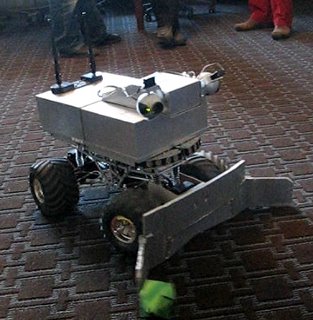No Syndrome. Just Imposter.

 I’ve just spent the weekend hanging out with a hundred assorted artists, scientists, activists, activist/scientists, scientist/artists, authors, game developers, journalists, journalist/scientists, scientist/authors, jactarviscidevthors, two Mars-rover robots with genetic programming, and a solar-powered car (which as far as I could tell, could only go downhill). Most of those interactions were fairly diffuse — there’s a limit to the number of folks you can actually sidle up to in a single weekend of freeform talks, demos, and debates. Some were a bit depthier. A few fed my ego (hey, there were people there who liked my books!). Many left me feeling humbled and completely inadequate. One or two did all of these at once.
I’ve just spent the weekend hanging out with a hundred assorted artists, scientists, activists, activist/scientists, scientist/artists, authors, game developers, journalists, journalist/scientists, scientist/authors, jactarviscidevthors, two Mars-rover robots with genetic programming, and a solar-powered car (which as far as I could tell, could only go downhill). Most of those interactions were fairly diffuse — there’s a limit to the number of folks you can actually sidle up to in a single weekend of freeform talks, demos, and debates. Some were a bit depthier. A few fed my ego (hey, there were people there who liked my books!). Many left me feeling humbled and completely inadequate. One or two did all of these at once.
I mean, at least you know what to expect when Lee Smolin of the Perimeter Institute takes the stage. He tells you up front that his goal is to leave you befuddled, and it takes him all of five minutes to convince us all that nobody really knows what mathematics even is— or, for that matter, what the word “exist” connotes. And when someone introduces herself by saying she liked Starfish, you of course immediately check her out online and are pleased to see that her expertise in systems theory means that she’s probably smarter than you, which is good because it means your success in fooling her definitely beat the odds.
But some people should come with warning signs. Polymaths should not go incognito. They should not be all down-to-earth and pass themselves off as someone who “teaches The Physics of Music to Artsies” and who happens to do a little jazz singing on the side when in fact they have a doctorate from fucking Oxford and are doing polymer microlithography with cell-design applications while “on the side” putting out three albums and singing for presidents1 and foreign dignitaries and jamming with people whose last names rhyme with Knopfler. They should not share hearty chuckles with you over that other attendee falling into a diabetic coma en route to the restaurant. Because when they do all these normal things you have no way of realizing how completely outclassed you are at this shindig, until you get back online. And by then, of course, it’s too late. You’ve already spent the whole damn evening acting like you belonged there.
And all of this really happened. To a friend of mine. The up side is, my friend’s list of people he can pester for help on technical issues is now a bit longer than it was.
It would, however, be a bit easier to stand on the shoulders of all these giants if they weren’t all several inches shorter than me.
1I’m not talking lame-ass company presidents either, here. I’m talking superpower presidents.









Besides all that, there is a small though non-zero chance that they have also spent time as professional badasses (SEAL, SAS, et cetera), but don’t put that on their website. Those guys tend to be very low-key about that sort of thing, you know.
It would, however, be a bit easier to stand on the shoulders of all these giants if they weren’t all several inches shorter than me.
Nah, they were all scrunching down to make you feel better.
But seriously, isn’t it really a thrill to be among so many people who are smarter than you are? Back when I was a regular conference goer, I used to love being in workshops with people who were smarter and more experienced than me. I learned a lot that way.